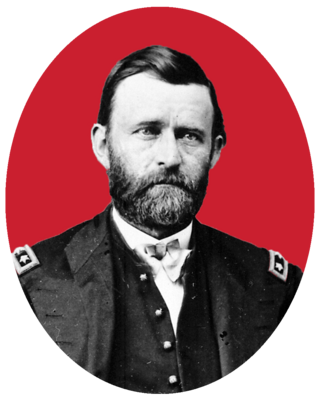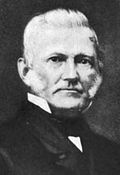
Presidential elections were held in the United States on November 6, 1860. The Republican Party ticket of Abraham Lincoln and Hannibal Hamlin won a national popular plurality, a popular majority in the North where states had already abolished slavery, and a national electoral majority comprising only Northern electoral votes. Lincoln's election thus served as the main catalyst of the states that would become the Confederacy seceding from the Union. This marked the first time that a Republican was elected president. It was also the first presidential election in which both major party candidates were registered in the same home state; the others have been in 1904, 1920, 1940, 1944, and 2016. Lincoln's 39.7% of the popular vote is to date the lowest for any winner not decided by a contingent election.

The 1924 Democratic National Convention, held at the Madison Square Garden in New York City from June 24 to July 9, 1924, was the longest continuously running convention in United States political history. It took a record 103 ballots to nominate a presidential candidate. It was the first major party national convention that saw the name of a woman, Lena Springs, placed in nomination for vice president. John W. Davis, a dark horse, eventually won the presidential nomination on the 103rd ballot, a compromise candidate following a protracted convention fight between distant front-runners William Gibbs McAdoo and Al Smith.

The 1860 Democratic National Conventions were a series of presidential nominating conventions held to nominate the Democratic Party's candidates for president and vice president in the 1860 election.

The 1908 Republican National Convention was held in Chicago Coliseum, Chicago, Illinois on June 16 to June 19, 1908. It convened to nominate successors to President Theodore Roosevelt and Vice President Charles W. Fairbanks.

The 1868 Republican National Convention of the Republican Party of the United States was held in Crosby's Opera House, Chicago, Cook County, Illinois, on May 20 to May 21, 1868. Ulysses S. Grant won the election and became the 18th president of the United States.
The 1868 Democratic National Convention was held at the Tammany Hall headquarters building in New York City between July 4, and July 9, 1868. The first Democratic convention after the conclusion of the American Civil War, the convention was notable for the return of Democratic Party politicians from the Southern United States.

The 1856 Republican National Convention was a presidential nominating convention that met from June 17 to June 19, 1856, at Musical Fund Hall at 808 Locust Street in Philadelphia, Pennsylvania. It was the first national nominating convention of the Republican Party, founded two years earlier in 1854. It was held to nominate the party's candidates for president and vice president in the 1856 election. The convention selected John C. Frémont, a former United States Senator from California, for president, and former Senator William L. Dayton of New Jersey for vice president. The convention also appointed members of the newly established Republican National Committee.

Charles Smith Olden was an American merchant, banker, and politician who served as the 19th governor of New Jersey from 1860 to 1863 during the first part of the American Civil War. As Governor, Olden supported President Abraham Lincoln and the national war effort but favored union and reconciliation with the South above all else; before the war, he argued slavery was properly understood as the sole regulatory province of the states, and he later opposed Lincoln's Emancipation Proclamation.
The 1864 Democratic National Convention was held at The Amphitheatre in Chicago, Illinois, United States.

The 1900 Democratic National Convention was a United States presidential nominating convention that took place the week of July 4, 1900, at Convention Hall in Kansas City, Missouri.
The 1928 Democratic National Convention was held at Sam Houston Hall in Houston, Texas, June 26–28, 1928. The keynote speaker was Claude G. Bowers. The convention resulted in the nomination of Governor Alfred E. Smith of New York for president and Senator Joseph T. Robinson of Arkansas for vice president.

The 1936 Republican National Convention was held June 9–12 at the Public Auditorium in Cleveland, Ohio. It nominated Governor Alfred Landon of Kansas for president and Frank Knox of Illinois for vice president.

The 1862–63 United States Senate elections were held on various dates in various states, occurring during the American Civil War. As these U.S. Senate elections were prior to the ratification of the Seventeenth Amendment in 1913, senators were chosen by state legislatures. Senators were elected over a wide range of time throughout 1862 and 1863, and a seat may have been filled months late or remained vacant due to legislative deadlock. In these elections, terms were up for the senators in Class 1.

The 1910 New Jersey gubernatorial election was held on November 8, 1910. Democratic nominee and future President Woodrow Wilson defeated Republican Assemblyman Vivian M. Lewis with 53.93% of the vote. During the campaign, Wilson underwent a political transformation from a symbol of conservative Wall Street reaction into one of the leading members of his party's progressive faction. His victory was widely understood to be the prelude to his campaign for the presidency in 1912.

The 1904 New Jersey gubernatorial election was held on November 8, 1904. Republican nominee Edward C. Stokes defeated Democratic nominee Charles C. Black with 53.50% of the vote.

The 1901 New Jersey gubernatorial election was held on November 5, 1901. Republican nominee Franklin Murphy defeated Democratic nominee James M. Seymour with 50.88% of the vote.

The 1898 New Jersey gubernatorial election was held on November 8, 1898. Republican nominee Foster McGowan Voorhees defeated Democratic nominee Elvin W. Crane with 48.91% of the vote.

The 1856 New Jersey gubernatorial election was held on November 4, 1856. William A. Newell, running on a fusion ticket opposed to the Franklin Pierce administration, defeated Democratic nominee William Cowper Alexander with 51.29% of the vote.

From March 9 to June 5, 1920, voters of the Democratic Party elected delegates to the 1920 Democratic National Convention, for the purposing of choosing a nominee for president in the 1920 United States presidential election.

The 1858 New York gubernatorial election was held on November 2, 1858. Incumbent Governor John A. King did not run for re-election to a second term in office. In the race to succeed him, Edwin D. Morgan defeated Amasa J. Parker and Lorenzo Burrows.




















